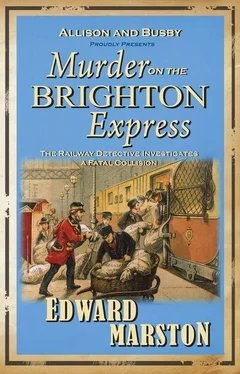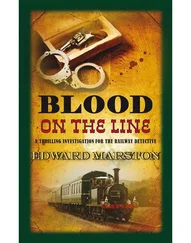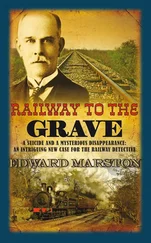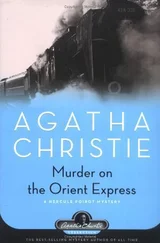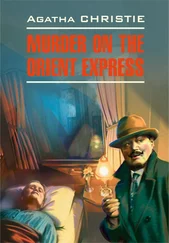Edward Marston - Murder on the Brighton express
Здесь есть возможность читать онлайн «Edward Marston - Murder on the Brighton express» весь текст электронной книги совершенно бесплатно (целиком полную версию без сокращений). В некоторых случаях можно слушать аудио, скачать через торрент в формате fb2 и присутствует краткое содержание. Жанр: Классический детектив, на английском языке. Описание произведения, (предисловие) а так же отзывы посетителей доступны на портале библиотеки ЛибКат.
- Название:Murder on the Brighton express
- Автор:
- Жанр:
- Год:неизвестен
- ISBN:нет данных
- Рейтинг книги:4 / 5. Голосов: 1
-
Избранное:Добавить в избранное
- Отзывы:
-
Ваша оценка:
- 80
- 1
- 2
- 3
- 4
- 5
Murder on the Brighton express: краткое содержание, описание и аннотация
Предлагаем к чтению аннотацию, описание, краткое содержание или предисловие (зависит от того, что написал сам автор книги «Murder on the Brighton express»). Если вы не нашли необходимую информацию о книге — напишите в комментариях, мы постараемся отыскать её.
Murder on the Brighton express — читать онлайн бесплатно полную книгу (весь текст) целиком
Ниже представлен текст книги, разбитый по страницам. Система сохранения места последней прочитанной страницы, позволяет с удобством читать онлайн бесплатно книгу «Murder on the Brighton express», без необходимости каждый раз заново искать на чём Вы остановились. Поставьте закладку, и сможете в любой момент перейти на страницу, на которой закончили чтение.
Интервал:
Закладка:
'What do you think happened in this case, Inspector?'
'It's too early to speculate.'
'The telegraph said that two trains had collided head-on.'
'One of them, fortunately, was carrying no passengers.'
'We're going to find the most terrible mess when we get there.'
'Yes,' said Colbeck, looking up at the sky. 'And the light is fading fast. That will hamper rescue efforts.'
'What exactly are we looking for?'
'What we always look for, Victor – the truth.'
It was like the aftermath of a battle. Mangled iron and shattered wood were spread over a wide area. Bodies seemed to be littered everywhere. Some were being lifted onto stretchers while others were being examined then treated on the spot. Dozens of people were using shovels and bare hands as they tried to clear the wreckage from the parallel tracks. The listless air of the wounded was offset by the frenetic activity of the railway employees. Carts were waiting to carry more of the injured away.
By the time that Colbeck and Leeming arrived at the site, lanterns and torches had been lit to illumine the scene. A few bonfires had also been started, burning the wood from the fractured carriages and the ruined wagons. Having met in a fatal collision, the two locomotives lay on their sides like beached whales, badly distorted, deprived of all power and dignity as they waited for cranes to shift their carcases. A knot of anxious people had gathered around each iron corpse, men for whom the destruction of a locomotive was tantamount to a death in the family.
As they picked their way through the debris, the detectives presented a curious contrast. Colbeck, the unrivalled dandy of Scotland Yard, was a tall, handsome, elegant man who might have stepped out of a leading role on the stage. Leeming, however, was shorter, stockier, lumbering and decidedly ugly. While the inspector looked as if he had been born in a frock coat, cravat, well-cut trousers and a top hat, the sergeant seemed to have stolen similar clothing without quite knowing how to wear it properly.
They soon identified the man they had come to see. Captain Harvey Ridgeon was the Inspector General of Railways, a job that consisted largely of investigating accidents throughout the system. He was standing near the two locomotives, talking to one of the many railway policemen on duty. Colbeck was surprised to see how young he was for such an important role. Ridgeon's predecessor had been a Lieutenant-Colonel who, in turn, had been preceded by a Major-General, both in their fifties and at the end of their military careers.
Ridgeon, however, was still in his thirties, a fresh-faced man of middle height with an almost boyish appearance. Yet he also possessed a soldier's bearing and a quiet, natural, unforced authority. Like all inspector generals, he had come from the Corps of Royal Engineers and thus had a good understanding of how the railways were built, maintained and run. When the detectives reached him, he had just parted company with the railway policeman. Colbeck performed the introductions. Though he gave them a polite greeting, Ridgeon was less than pleased to see them.
'It's good to meet you at last, Inspector Colbeck,' he said. 'Your reputation goes before you. But I fail to see why you made the effort to get here. What we need are doctors, nurses and stretcher-bearers, not a couple of detectives, however distinguished their record.'
'We were summoned by the company itself, Captain Ridgeon.'
'Then you must feel free to look around – as long as you don't impede the railway policemen. They can be very territorial.'
'We've found that in the past, sir,' noted Leeming.
'I've had occasional difficulties with them myself.'
'I have to admire the way you got here so promptly,' observed Colbeck, weighing him up with a shrewd gaze. 'I didn't expect you to turn up before morning.'
'This was a dire emergency,' said Ridgeon, taking in the whole scene with a gesture, 'and I reacted accordingly. As luck would have it, I was staying with friends in Worthing so I was able to respond quickly when the alarm was raised. Had I still been in Carlisle, where I investigated an accident at the start of the week, then it would have been a very different matter. Before that, I was in Newcastle.'
'You're very ubiquitous, Captain Ridgeon.'
'I have to be, Inspector. Accidents occur all over the country.'
'That's my complaint,' Leeming put in. 'There are far too many of them. Step into a train and you put your life in peril.'
'Part of my job is to eliminate peril,' said Ridgeon. 'I only have powers to inspect and advise but they are important functions. Each accident teaches us something. My officers and I make sure that the respective railway companies learn their lesson.'
'Then why do accidents keep on happening?' Leeming saw two men vainly trying to lift a section of a wrecked carriage. 'Excuse me,' he said, moving away. 'Someone needs a helping hand.'
Taking off his coat, Leeming was soon lending his considerable strength to the two men. The timber was easily moved. Ridgeon and Colbeck watched as the sergeant started to clear away more debris.
'We could have done with Sergeant Leeming's assistance when the accident actually happened,' said Ridgeon. 'It was a case of all hands to the pumps then. Believe it or not, things are much better now. It was chaos when I first arrived. Those with the most serious injuries have all been taken away now.'
'There still seem to be plenty of walking wounded,' said Colbeck, looking around. 'Who is that gentleman over there, for instance?'
He pointed towards a man in clerical garb whose hands and head were heavily bandaged yet who was helping an elderly woman to her feet. Having got her upright, he went off to console a man who was sitting on the grass and weeping copiously into a handkerchief.
'That's the Reverend Ezra Follis,' explained Ridgeon. 'He's a remarkable fellow. He was injured in the crash but, as soon as he was bandaged up, he did his best to offer comfort wherever he could.'
'He obviously has great resilience.'
'He also has a strong stomach, Inspector Colbeck. When they hauled out the driver of the ballast train, he was in such a hideous condition that some people were promptly sick. That little clergyman is made of sterner stuff,' Ridgeon went on with admiration. 'He didn't turn a hair. He threw a blanket over the remains then helped to lift them on to a cart, saying a prayer for the salvation of the man's soul.'
'How many fatalities have there been so far?' asked Colbeck.
'Six.'
Colbeck was surprised. 'Is that all?'
'Yes, Inspector,' replied Ridgeon. 'Given the circumstances, it's a miracle. Mind you, some of the survivors have terrible injuries and are being treated in hospital. According to the Reverend Follis, the Brighton Express left the track and careered alongside it for a couple of minutes before hitting the other train.'
'In other words, the passengers had time to brace themselves.'
'Exactly.'
'I must speak to the Reverend Follis myself.'
'He's an interesting character.'
'I assume that the driver and fireman of both locomotives died in the crash,' said Colbeck, sadly.
'Those on the footplate of the ballast train were killed outright. The driver of the express must also be dead because he's buried beneath his engine. Until a crane arrives, we can't dig him out.'
'What about his fireman?'
'John Heddle was more fortunate,' said Ridgeon. 'He jumped from the footplate before the collision took place. He sustained a nasty head injury during the fall and was still very dazed when I spoke to him, but at least he survived and will be able to give us confirmation.'
'Confirmation?' echoed Colbeck.
'Yes – of what actually happened. The general feeling among the passengers is that the express went too fast around a bend and jumped off the track. In short, the driver was at fault.'
Читать дальшеИнтервал:
Закладка:
Похожие книги на «Murder on the Brighton express»
Представляем Вашему вниманию похожие книги на «Murder on the Brighton express» списком для выбора. Мы отобрали схожую по названию и смыслу литературу в надежде предоставить читателям больше вариантов отыскать новые, интересные, ещё непрочитанные произведения.
Обсуждение, отзывы о книге «Murder on the Brighton express» и просто собственные мнения читателей. Оставьте ваши комментарии, напишите, что Вы думаете о произведении, его смысле или главных героях. Укажите что конкретно понравилось, а что нет, и почему Вы так считаете.
